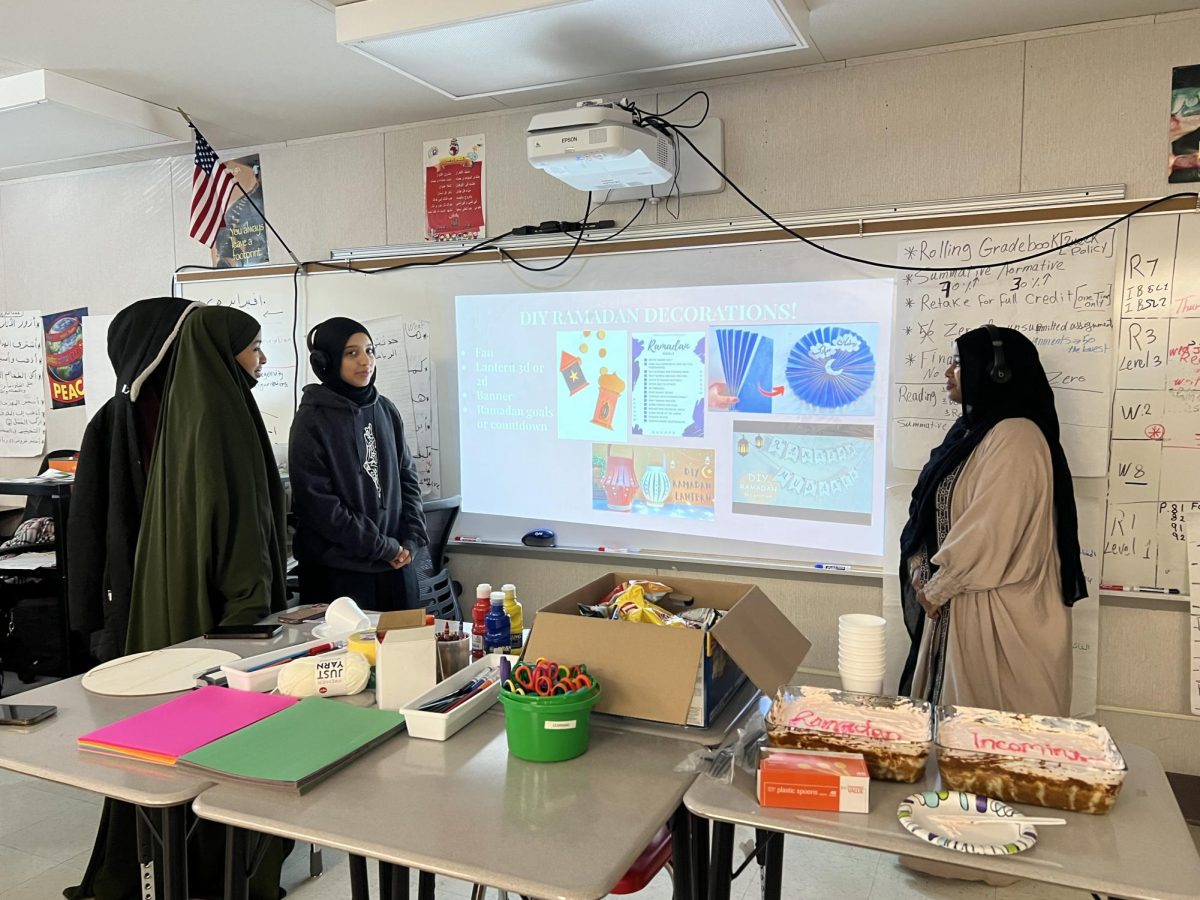Ramadan is right around the corner and for many Annandale High School Muslim students, it’s a time for reflecting, prayer, and fasting for 30 days. It is expected to start on February 28 and end on March 29. Students will fast during the school day, break their fast with Iftar in the evening, and get up before sunrise to eat Suhoor (pre-dawn meal). Beyond its religious significance, however, Ramadan evokes discipline and a community, influencing the daily lives of people who follow it.
“I don’t face many challenges being in school and fasting because it’s all for Allah’s sake,” senior Alaa Mohammed said. “Ramadan is such a special time for me because it brings me closer to Allah,” she added.
Keeping up with academics while fasting for almost 14 hours is not an easy thing. Without food or water, students go through lectures, tests, and other assignments. While some people pace themselves during the day to be active, others nap after school to replenish their energy.
“During Ramadan it’s actually really hard to keep up with school work, cause you try to do your best in the religion,” sophomore Amira Amer said. “Since my routine changes, I wake up to eat and then after I eat, I pray and then I do my homework, or if I need to study, I’ll do it the night before or early in the morning,” she added.
Some students turn into night owls, finishing their assignments after Iftar, remaining up until Suhoor, and then finding time to snooze after school. “I support my Muslim friends whenever they are about to slip up by reminding them the principles and encouraging them to stay on track,” freshman Tsion Mamo said.
Besides, teachers are crucial in helping students who are fasting. Some are considerate of modifying workloads to suit people with less stamina, many let students spend lunch or PE in more sedate locations rather than the cafeteria or gym. Particularly, students find that being among other students who are eating presents more of a struggle than simply fasting.
“My PE teacher last year would let us go to the library when he knew we were fasting,” sophomore Isra Faqi said. “However, I’m in driver’s ed now and I don’t think we will continue doing that,” she added.
Alongside that, a significant part of getting through the day is staying hydrated throughout Suhoor and Iftar because students are unable to consume water during their fast. To save energy, they steer clear of extreme physical activity during the day.
“I try not to use too much of my energy; I have a strict schedule for myself to reserve my energy.” Isra said. “I make sure I go to class early, and the second the bell rings, I quickly get to the bus and the second I get home, I guarantee that I fall asleep,” she added.
Furthermore, although fasting is an individual journey, it also fosters connection to a community. Through club meets and charitable tasks, Annandale’s Muslim Student Association (MSA) builds solidarity among students.
“Every Ramadan, MSA hosts an annual Iftar potluck,” Amira said, who is also the MSA event coordinator. “We come together as a community, everybody gets one thing, and we bond, get to know each other, then finally break our fast.” she added.
Iftar, when students finally break their fast, is one of the most eagerly awaited times of the day. Some find ways to spend the moment with peers, even at school, but the majority eat with family at home. This sense of community is what makes Annandale’s Ramadan special as it promotes connection among students via shared experiences and cultural understanding.
“I broke my fast last year with dates and water with my family, we then ate normal meals,” senior Isra Mohammed said. “This year we’ll make sure to feed our neighbors as our neighbors are very important,” she added.
Breaking the fast with dates and water follows the Sunnah tradition of Prophet Muhammad, which many Muslims follow before diving into a full meal. Islam as a whole emphasizes kindness, community, and generosity.
Sharing meals with neighbors, especially those in need, is a method to enhance connections and reap spiritual benefits during Ramadan, which places a strong emphasis on giving.
“Ramadan isn’t just about abstaining from food and drinks or losing weight, it’s also about being mindful,” Alaa said.
Anticipating Eid al-Fitr, the celebration that signifies the conclusion of Ramadan, is one of the most enjoyable aspects of the whole journey. Students get together with extended family, get excited for preparations, like planning celebrations, getting Henna, and purchasing new clothes.
Many students in Annandale will be juggling their daily schedules as Ramadan starts, and the joy of it permeates at AHS given its diverse set-ting, whether students are fasting or encouraging those who are, it creates a sense of unity among students. The community is further emphasized by the celebration of Eid al-Fitr, concluding Ramadan. Ramadan Mubarak to all who celebrate!










